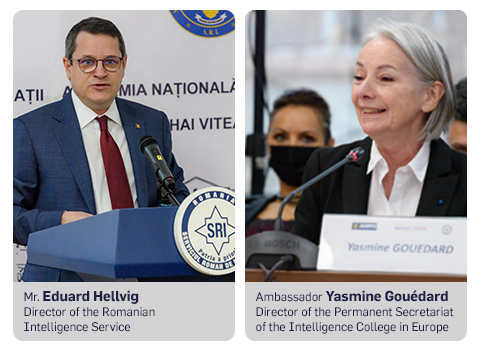
On the 7th December 2021, a Round Table on the topic of “European Security Policy, Strategic Autonomy and the Role of the Intelligence College in Europe in building a common strategic culture” took place in the “Mihai Viteazul” National Intelligence Academy, in Bucharest. The event was affiliated to the French Ministry of Armed Forces initiative La Fabrique Défense and was attended by the Director of the Romanian Intelligence Service, Mr. Eduard Hellvig, representatives of the Romanian Intelligence Community and Academia, and the Director of the Permanent Secretariat of the Intelligence College in Europe, Mrs. Yasmine Gouédard.
The panellists addressed how Europe must develop its common strategic culture, in order to achieve its strategic autonomy to tackle the growing array of threats. The latter, which jeopardise both national and European security, were key elements in Mr. Eduard Hellvig’s speech. Mrs. Gouédard also addressed the issue, stating that:
“We are now at a very important moment: we realize that we, as Europeans, are equally responsible for our European security. We have to face the threats we have been dealing with for many years now, but which are persistent, such as terrorism, organized crime and trafficking, as well as the challenging matter of migration. We also have to deal with some older threats, we had thought long gone, but which are actually more relevant than ever, such as the aggressive policies conducted in different manners by the Russian Federation or China for instance. Finally, we must learn how to tackle new threats, including global warming, the rising epidemiological risk, or the consequences of new information technologies and artificial intelligence on the way information is handled in our democracies.”
Mrs. Yasmine Gouédard
The Director of the Permanent Secretariat stressed how the College, via its activities, plays a key role in associating European intelligence communities in this common endeavour. With a focus on European Security policy, SRI Director Eduard Hellvig confirmed the pivotal role of the Intelligence College in Europe in promoting a common strategic vision, academic excellence and a proactive approach to threats. He pointed out the importance of raising awareness among all actors, both organisations and citizens, with regard to threats such as propaganda, misinformation, social polarisation or extremism, which can only be countered by the active solidarity of citizens with their own national intelligence community and by strengthening educational efforts.
“I hope that the College, as well as other platforms with similar goals, will continue to expand and refine their programmes so that together we can become stronger and better at addressing threats by means of sustainable security practices.”
Mr. Eduard Hellvig